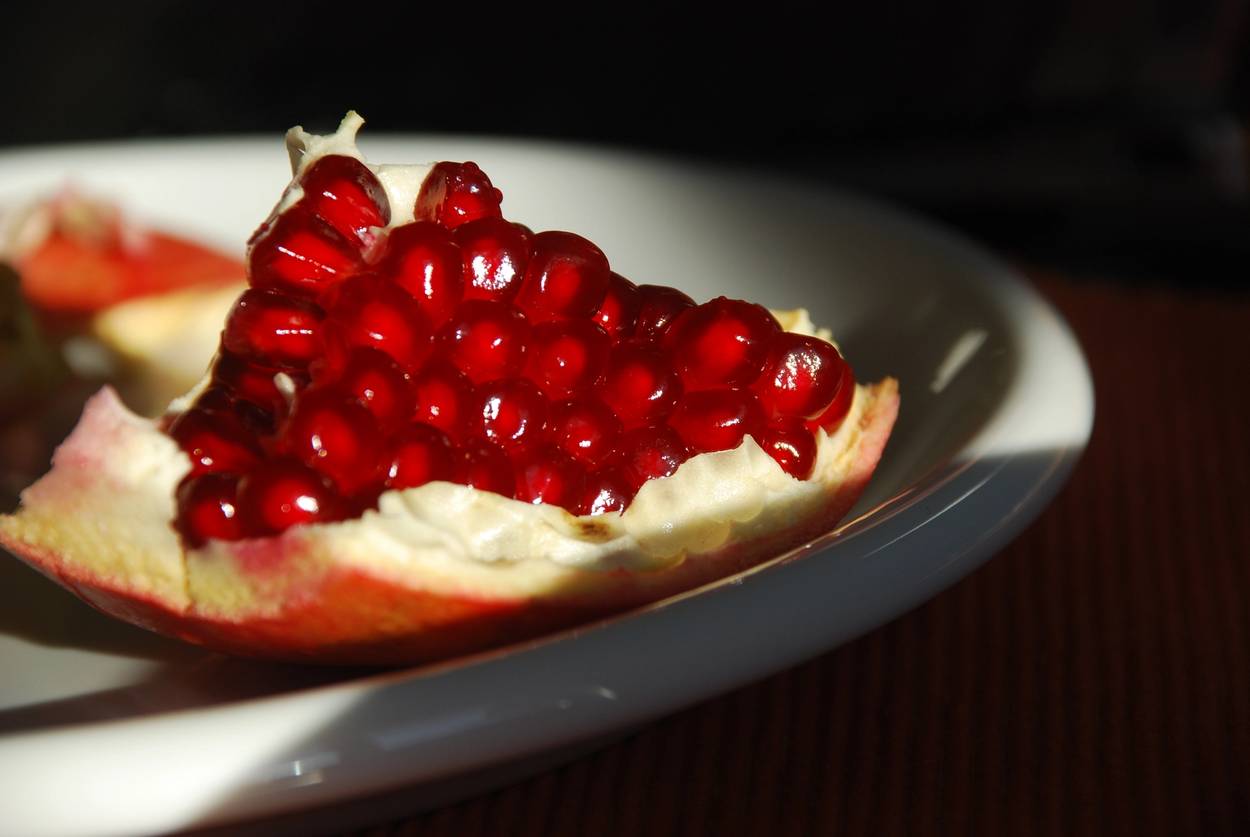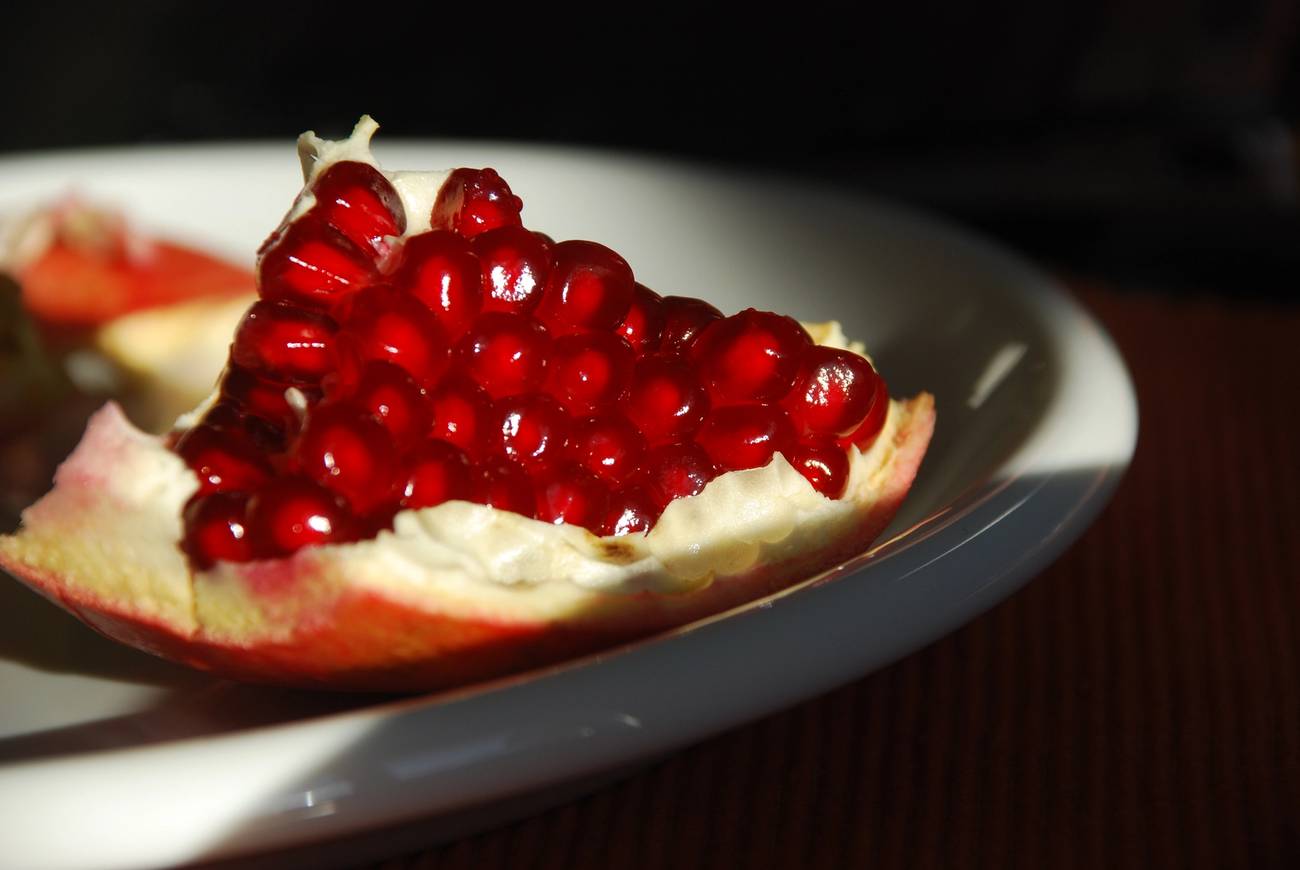Consider the Pomegranate
It’s more than symbolic—it’s delicious, if you know what to do with it. Try it for dessert this Rosh Hashanah.




A most Jewish fruit, the pomegranate has a history even more indelible than its juice. With its distinctive crown-topped shape, it’s recognizable to many Jews as an object, typically making its annual guest appearance on the dinner table around Rosh Hashanah. Yet its culinary fortitude tends to be downplayed by many Jews (especially Ashkenazim), its puckery flavor still on the outskirts of the American palate.
Native to what is now Iran, the pomegranate is one of the oldest domesticated fruit trees in the Middle East, with anthropologists dating its cultivation back to about the fifth century BCE. It makes numerous appearances in Jewish texts, notably as one of the Seven Species in the Hebrew Bible—crops exalted in the Land of Israel. The ancient Israelites would have used the pomegranate in a variety of fashions, culinarily and otherwise. It certainly would have been used in winemaking, the most efficient way to enhance enjoyment and mitigate spoilage. Its seeds, eaten fresh or dried, would also have doubled as a potent red dye for garments and tapestries.
The pomegranate has a robust iconographic history—making appearances on ancient Judean coins and adorning pillars in the First Temple. It’s also a prominent design element in Torah coverings, ancient and contemporary; the round finials that adorn the tops ofTorah scrolls are called rimonim (the Hebrew plural of pomegranate), the spherical shape and sweetness of the fruit providing the name.
It seems the pomegranate first appeared on the Rosh Hashanah table around the 14th century. We can credit Rabbi David Abudarham, an Andalusian rabbi noted for his Sefer Abudarham, with the first written link between the ancient fruit and the Jewish new year: “May our blessings proliferate like the [seeds of the] pomegranate.” So the prayer goes. It’s still a contemporary custom, particularly among Sephardic communities, to mythologize that pomegranates contains as many seeds (613) as there are mitzvot.
This is all to say: This time of year, as the pomegranate enters a period of spiritual and agricultural abundance—its peak season begins around early autumn—the home cook is often miffed, at a loss for what to do with a most lauded, most curious Jewish fruit.
It’s certainly the black sheep of produce in the restaurant industry. During my years as a chef, I found myself scandalized by the derision the pomegranate faced. A resounding Uch! and a withering eye roll were the general reaction from colleagues. Sometimes, if the mood lifted, a few seeds would end up on a delicate salad. Always a garnish, never a bride.
Maybe it’s the press, or an American sensibility that values the familiar, that’s kept the pomegranate at the proverbial kids’ table. Maybe this Rosh Hashanah, it’s time for it to move on up and become more than a symbol in a centerpiece, or a salad topper.
Flavorwise, pomegranates have a special tang, resting somewhere between sweet and tart. They’re fresh, but also have a subtle tannic structure—the same properties that give wine its astringent sensation—meaning they pair well with both sweet and savory fare.
They’re brilliant in appetizers—I’m a fan of badrijani, a Georgian dish composed of eggplant, rolled around a filling of nuts and topped with pomegranate seeds. Fancy an entree? They provide the main flavor of fesenjan, a Persian stew with walnuts and poultry. In the beverage department, pomegranates are the main ingredient in grenadine, the sweet-tart syrup essential to a Shirley Temple.
But it’s my affection for dessert that makes me especially fond of pomegranates. Freeze some sweetened pomegranate juice to make the world’s easiest granita. Or utilize the tart notes of pomegranate to balance out the richness of this rice pudding. The beauty of this dessert is its unabashed simplicity. It’s also dairy-free, though if you feel the urge to toss in some butter, no one will stop you.
This dish also brings back particularly sweet memories, my father picking me up from school and taking me to my favorite restaurant—a very rundown kebab shop, run by a very lovely, very toothless Persian Jew. I would always get a rice pudding. And, if I was lucky, a pomegranate juice.
Hugh J. Remar is a bartender and chef from New York City.